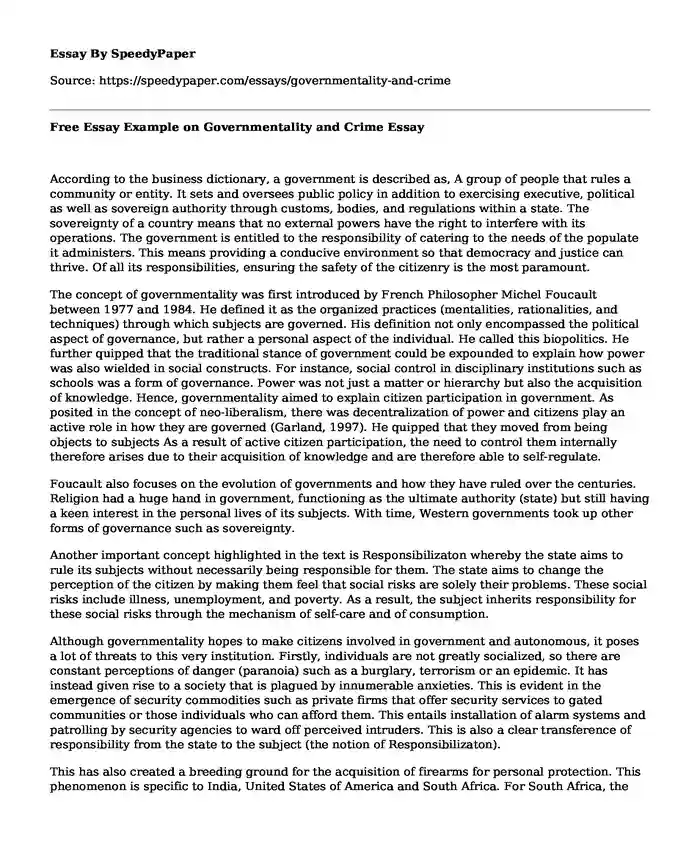
| Type of paper: | Essay |
| Categories: | Criminal law Philosophy Government Gun control |
| Pages: | 3 |
| Wordcount: | 804 words |
According to the business dictionary, a government is described as, A group of people that rules a community or entity. It sets and oversees public policy in addition to exercising executive, political as well as sovereign authority through customs, bodies, and regulations within a state. The sovereignty of a country means that no external powers have the right to interfere with its operations. The government is entitled to the responsibility of catering to the needs of the populate it administers. This means providing a conducive environment so that democracy and justice can thrive. Of all its responsibilities, ensuring the safety of the citizenry is the most paramount.
The concept of governmentality was first introduced by French Philosopher Michel Foucault between 1977 and 1984. He defined it as the organized practices (mentalities, rationalities, and techniques) through which subjects are governed. His definition not only encompassed the political aspect of governance, but rather a personal aspect of the individual. He called this biopolitics. He further quipped that the traditional stance of government could be expounded to explain how power was also wielded in social constructs. For instance, social control in disciplinary institutions such as schools was a form of governance. Power was not just a matter or hierarchy but also the acquisition of knowledge. Hence, governmentality aimed to explain citizen participation in government. As posited in the concept of neo-liberalism, there was decentralization of power and citizens play an active role in how they are governed (Garland, 1997). He quipped that they moved from being objects to subjects As a result of active citizen participation, the need to control them internally therefore arises due to their acquisition of knowledge and are therefore able to self-regulate.
Foucault also focuses on the evolution of governments and how they have ruled over the centuries. Religion had a huge hand in government, functioning as the ultimate authority (state) but still having a keen interest in the personal lives of its subjects. With time, Western governments took up other forms of governance such as sovereignty.
Another important concept highlighted in the text is Responsibilizaton whereby the state aims to rule its subjects without necessarily being responsible for them. The state aims to change the perception of the citizen by making them feel that social risks are solely their problems. These social risks include illness, unemployment, and poverty. As a result, the subject inherits responsibility for these social risks through the mechanism of self-care and of consumption.
Although governmentality hopes to make citizens involved in government and autonomous, it poses a lot of threats to this very institution. Firstly, individuals are not greatly socialized, so there are constant perceptions of danger (paranoia) such as a burglary, terrorism or an epidemic. It has instead given rise to a society that is plagued by innumerable anxieties. This is evident in the emergence of security commodities such as private firms that offer security services to gated communities or those individuals who can afford them. This entails installation of alarm systems and patrolling by security agencies to ward off perceived intruders. This is also a clear transference of responsibility from the state to the subject (the notion of Responsibilizaton).
This has also created a breeding ground for the acquisition of firearms for personal protection. This phenomenon is specific to India, United States of America and South Africa. For South Africa, the disintegration of apartheid meant that segregation as a means of crime control no longer worked. Crime rates in traditionally white communities increased and as a result, more individuals felt the need to protect themselves. In India, the increased incidences of rape made women panic and, therefore, most resorted to personal security. The Constitution of the United States of America, under its second amendment, enables citizens to acquire firearms. This is seen as an end solution when the rates of gun incidences are actually increasing as a result of increased anxiety among Americans.
The increased need for citizens to take matters into their hands spells a wanting need for the contemporary sovereign government actually to protect its citizenry. The culture of control has not only permeated in the United States of America but also the world at large. Gun politics cut across, and often exacerbate, enduring forms of inequality, disempowerment and privilege (Carlson, 2014). The concept of governmentality is however not very familiar to non-western governments and for this reason, they are still able to maintain their sovereignty and power. Citizens emerging needs to perform state functions ought to be eliminated to avoid wanton violence and deaths, even anxieties harbored by them. The sovereign states ought to strike a balance between monopolization of its services and citizens active participation in it.
References
Carlson, J. D. (2014). States, subjects, and sovereign power: Lessons from global gun cultures. Theoretical Criminology, 335 353.
Garland, D. (1997). Governmentality and the problem of crime. Theoretical Criminology, 173-214.
Cite this page
Free Essay Example on Governmentality and Crime. (2019, Jun 24). Retrieved from https://speedypaper.com/essays/governmentality-and-crime
Request Removal
If you are the original author of this essay and no longer wish to have it published on the SpeedyPaper website, please click below to request its removal:
- Essay Example on Gender Stereotypes in Media
- Should the United States Have Gone to War in Vietnam? Essay Example
- Achieving Sustainability in Supply Chains, Free Essay
- Essay Sample on Obesity among Children
- My Christmas Holyday - Personal Experience Essay for Free
- Free Essay on John Lock's View on Marriage
- Free Essay Sample on Reasons Why You Should Not Shoplift
Popular categories




